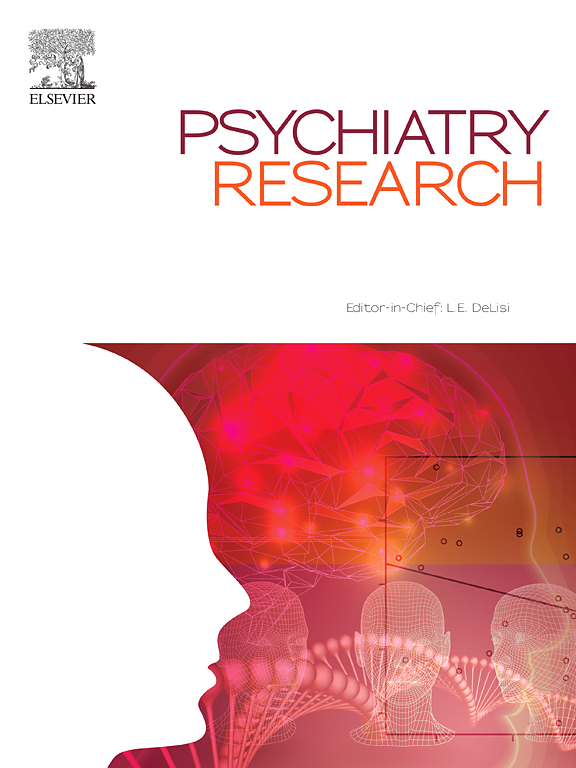A pilot randomized controlled trial of a digital cannabis harm reduction intervention for young adults with first-episode psychosis who use cannabis
IF 3.9
2区 医学
Q1 PSYCHIATRY
引用次数: 0
Abstract
Cannabis use is widespread and associated with worsened prognosis for young adults with first-episode psychosis (FEP). Few cannabis harm reduction interventions have been evaluated for this population, despite potential to improve outcomes in those not ready for cannabis abstinence/reduction-focused interventions. This study aimed to determine a) the acceptability of a digital harm reduction intervention, the Cannabis Harm-reducing App to Manage Practices Safely (CHAMPS) and b) the feasibility of conducting a trial comparing FEP-specialized early intervention services (EIS)+CHAMPS versus EIS-only with this population. We conducted a multi-site pilot randomized controlled trial comparing both arms in 101 young adults (18 - 35 years old) with FEP using cannabis and attending EIS. Primary outcomes were trial retention rate (i.e., proportion of randomized participants retained at week 6; trial feasibility assessment) and CHAMPS completion rate (i.e., proportion of intervention participants completing four of six modules; CHAMPS acceptability assessment). Trial retention rate above 60 % indicated feasibility and completion rate above 50 % indicated acceptability. Additional outcomes included harm reduction strategy use, motivation to change cannabis behaviors, cannabis-related problems, cannabis use, psychotic symptoms and dependence severity, assessed at baseline, weeks 6, 12 and 18. Trial retention was 82.2 % and completion rate was 58.8 %, suggesting trial feasibility and CHAMPS acceptability. Signals of possible improvement in the intervention group were observed regarding harm reduction strategy use, motivation to change behaviors, cannabis-related problems and cannabis use frequency. This study supports conducting an efficacy trial assessing the potential of CHAMPS in improving outcomes for young adults with psychosis using cannabis.
一项针对使用大麻的首发精神病年轻人的数字大麻减少危害干预的随机对照试验
大麻的使用是广泛的,并与患有首发精神病(FEP)的年轻人预后恶化有关。针对这一人群的减少大麻危害干预措施很少进行评估,尽管可能改善那些尚未准备好接受以大麻戒断/减少为重点的干预措施的结果。本研究旨在确定a)数字减少危害干预的可接受性,即大麻危害减少应用程序安全管理实践(CHAMPS),以及b)在该人群中进行比较fep专业早期干预服务(EIS)+CHAMPS与仅EIS的可行性试验。我们进行了一项多地点的随机对照试验,比较了101名年轻成年人(18 - 35岁)使用大麻和参加EIS的FEP。主要结果是试验保留率(即第6周随机受试者保留的比例;试验可行性评估)和CHAMPS完成率(即干预参与者完成六个模块中的四个模块的比例;CHAMPS可接受性评估)。试验保留率超过60%表明可行性,完成率超过50%表明可接受性。其他结果包括减少危害策略的使用、改变大麻行为的动机、大麻相关问题、大麻使用、精神病症状和依赖严重程度,在基线、第6、12和18周进行评估。试验保留率为82.2%,完成率为58.8%,表明试验的可行性和CHAMPS的可接受性。干预组在减少危害策略的使用、改变行为的动机、大麻相关问题和大麻使用频率方面观察到可能改善的信号。本研究支持开展一项疗效试验,评估CHAMPS在改善使用大麻的年轻精神病患者预后方面的潜力。
本文章由计算机程序翻译,如有差异,请以英文原文为准。
求助全文
约1分钟内获得全文
求助全文
来源期刊

Psychiatry Research
医学-精神病学
CiteScore
17.40
自引率
1.80%
发文量
527
审稿时长
57 days
期刊介绍:
Psychiatry Research offers swift publication of comprehensive research reports and reviews within the field of psychiatry.
The scope of the journal encompasses:
Biochemical, physiological, neuroanatomic, genetic, neurocognitive, and psychosocial determinants of psychiatric disorders.
Diagnostic assessments of psychiatric disorders.
Evaluations that pursue hypotheses about the cause or causes of psychiatric diseases.
Evaluations of pharmacologic and non-pharmacologic psychiatric treatments.
Basic neuroscience studies related to animal or neurochemical models for psychiatric disorders.
Methodological advances, such as instrumentation, clinical scales, and assays directly applicable to psychiatric research.
 求助内容:
求助内容: 应助结果提醒方式:
应助结果提醒方式:


